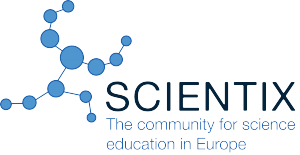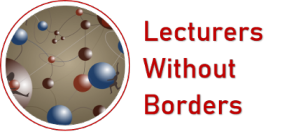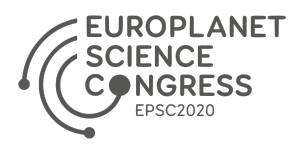EPSC 2020 goes live for schools
For the first time, the Europlanet Science Congress (EPSC) 2020, a scientific conference on planetary science, is opening its doors to schools and will give students a glimpse of how contemporary science is done.
Teachers and students are kindly invited to join us virtually with their classroom or educational institute (suggested age range 12-18 years old or older).
When: This autumn from the 21st of September – 9th of October 2020, presenters from all over the world will make their work available to schools to follow online. For 3 weeks, a list of topics on high level planetary science, ranging from the Moon to the exoplanets and laboratory experiments will be given.
Events:
Events:
- 1. List of scientific talks with plain language summary (available on-demand video)
- 2. Every week a Q&Α session with one of the experts will be broadcasted live, and the students will have the opportunity to pose questions to them.
- 3. Supporting workshops will be organised by both experienced and young researchers on introductory topics, targeted at students who wish to learn more about e.g.:
- How we calculate the Age of the Earth
- A trip to Antarctica to chase meteorites
- Our solar system and its weird cousins
- What is “Astrobiology”?
- “Anatomy” of a Scientific talk (students vote their favourite scientific talk).
See the full programme of webinars
These activities are kindly being organised by the researchers of Lecturers without Borders, the Europlanet Early Career (EPEC) Network and the Diversity Committee of the Europlanet Society.
Please register your Intention to participate (non binding from your part), either in the live or in the recorded events, according to the technical capabilities of your classroom, in the following form:
Registration link: https://form.jotform.com/202154005635040
Registration deadline for schools: 15th September 2020
Let’s open up science to young students and give them the chance to ask experts in planetary science questions directly! The events will be held in English, with a possibility of a follow-up in the native language of the speaker, if different from English (French, Greek and Russian are already included). More to be announced soon.
With the kind support of the Diversity Committee of the Europlanet Society, Lecturers without Borders, Europlanet Early Career network (EPEC), Scientix and Frontiers in Science.
Other activities for schools and educators
Arts Competition: Schools are also invited to participate in the EPSC arts contest #InspiredByOtherWorlds. If you have been inspired, create and share your drawings, storytelling, pictures, videos, models, craft works or art installations at home. The deadline for submissions is 31st of October. There are no age restrictions for participants. You can find more information on the contest at https://www.europlanet-society.org/outreach/inspiredbyotherworlds-arts-contest/ If you’d also like to share on social media please use the hashtags #InspiredByOtherWorlds #EPSC2020.
Check out Europlanet’s educational resources.
More about Outreach at EPSC 2020
Programme of the webinars:
– Sep 24th, 5pm CET / Webinar (english) + Q&A (english&french)
What is Astrobiology?
Webinar with Ulysse Pedreira-Segade (Rensselaer Astrobiology Research and Education Center (RARE), Rensselaer Polytechnic Institute, Troy, NY) and Julia Brodsky (Blue marble Institute of Science, Founder of Art of Inquiry) in English, Q&A session is possible to have in English and French. Description to be provided
– Sep 30th, 12h CET / Webinar (english) + Q&A (english&greek)
Searching for meteorites in Antarctica
Webinar with Ioannis Baziotis (Agricultural University of Athens) in English, Q&A session is possible to have in Greek
Antarctica represents a unique continent. It is the windiest, coldest, driest, highest continent on earth. Also, it is an ideal place to find meteorites. Mr. Baziotis was part of Antarctic Search for Meteorites (ANSMET) mission, which is a cooperative effort by NASA, the U.S. National Science Foundation, and the Smithsonian Institution. At the webinar the students will learn about the difficulties to be in Antarctica, the passion for searching the rocks formed during the early Solar system, the motivation to wait until the dream of a scientist came true (selection for ANSMET). They will learn how the study of meteorites help us to understand the processes form the different components within our solar system, and how they really evolved through time. The participants, will learn what a meteorite is, and which are the primary features to look at, in order to identify their extra-terrestrial origin. Finally, the students, will have the chance to look (unfortunately through their screens) real meteorites.
Ioannis Baziotis is mineralogist-petrologist, studying a variety of rocks, both of terrestrial and extra-terrestrial origin. I.B. is assistant professor at the Agricultural University of Athens, with numerous International collaborations, published works, and dissemination activities. He is the only Greek who participated, in the highly prestigious –NASA-funded– mission, Antarctic Search for Meteorites (ANSMET).
– Sep 30th, 1pm CET / Webinar (english) + Q&A (english&greek)
A walk on the moon
Webinar with Kosmas Gazeas (University of Athens) in English, Q&A session is possible to have in Greek.
Kosmas will talk to us about Lunar Habitability and our current efforts for visiting permanently the Moon.
Kosmas Gazeas studied Physics at the Aristotle University of Thessaloniki and received his postgraduate and doctoral degree in Observational Astrophysics from the National and Kapodistrian University of Athens. Today, he is a Lecturer in Astrophysics at the Department of Physics of the University of Athens.His educational and research work focuses on the astronomical observation of double ecliptic stars, supernovae, blazar, and black holes. His post-doctoral research was conducted at the Harvard-Smithsonian Center for Astrophysics in the US, where he worked with images of the Hubble Space Telescope (NASA). He worked at the European Space Agency in the Netherlands, focusing on space and technology.
– Oct 5th, 8am CET / Webinar (english) + Q&A (english&russian)
Our solar system and its weird cousins
Webinar with Georgy Makhatadze (University of Copenhagen) and Rajika Kuruwita (University of Copenhagen) in English, Q&A possible to have in English and Russian.
Are we unique? Or can solar systems like ours form easily? – and would that mean life can exist just as easily? We look at our own solar system and discover the diversity of worlds in it. We then look at evidence we have, such as meteorites from the Moon, Mars, and young planets, and discuss what it says about how our sun and planets form. Then we look at how other stars are forming and what other solar systems look like. We try to answer questions about: Is our solar system unique? What do observations of other solar systems say about our own system? How well does our theory of solar system formation work for all the different types of planets discovered? The lecture covers basics of different stars and planets related research fields. We don’t really pose any prerequisites fro students willing to listen in terms of what they know already but we cover a number of complicated concepts so we aim mostly at high schoolers.
Georgy Makhatadze is a PhD student working at the Centre for Star and Planet Formation, University of Copenhagen. Before that he graduated from the Faculty of Geology of Lomonosov Moscow State University. He has been engaging in science communication starting 2016, mostly by giving lectures.
Rajika Kuruwita is a postdoctoral researcher at the University of Copenhagen. I simulate the formation of stars to study their dynamical interactions and determine the influence these interactions could have on potential planet formation and population statistics.
– Oct 9th, 10am CET / Webinar (english) + Q&A (english&greek&possibly italian)
“Anatomy” of a scientific talk
Webinar with Athanasia Nikolaou (La Sapienza University of Rome) and Emmanuel Chaniotakis(Ellinogermaniki Agogi School) in English, Q&A is possible to have in Greek
Athanasia Nikolaou has studied physics in Athens, Greece, holds a MSc in climate science and a PhD in planetary science. She has worked in the Advanced Concepts Team of the European Space Agency in the Netherlands and in the German Aerospace Center in Germany. She is part of the international science consortium of the ARIEL space mission, currently working in La Sapienza University of Rome, Italy. Her research focuses on planetary evolution, the stability of dynamical systems and climate processes on early Earth and on exoplanets. She is a co-founder of Lecturers Without Borders. “
Emmanuel Chaniotakis is a Physicist with MSc in High Energy Physics, and works as a researcher at the RnD department of Ellinogermaniki Agogi School in Greece. His work is focused on: the design and implementation of ICT-enhanced, inquiry based educational activities in the field of Physics; Teacher training and support in ICT- enhanced, inquiry based science education; the organization and support of international training activities such as summer schools and the organization of educational competitions. He is a PhD candidate in Science Education at the Faculty of Educational Studies of the National and Kapodistrian University of Athens.
– Oct 9th, 11am (tbc) / Webinar (english) + Q&A (english&spanish)
Women space engineers
Webinar with Sarah Rodriguez-Castillo (European Space Agency, The Netherlands) and Yaquelin Rosas (German Aerospace Center, Berlin) in English, Q&A session possible to have in Spanish.








